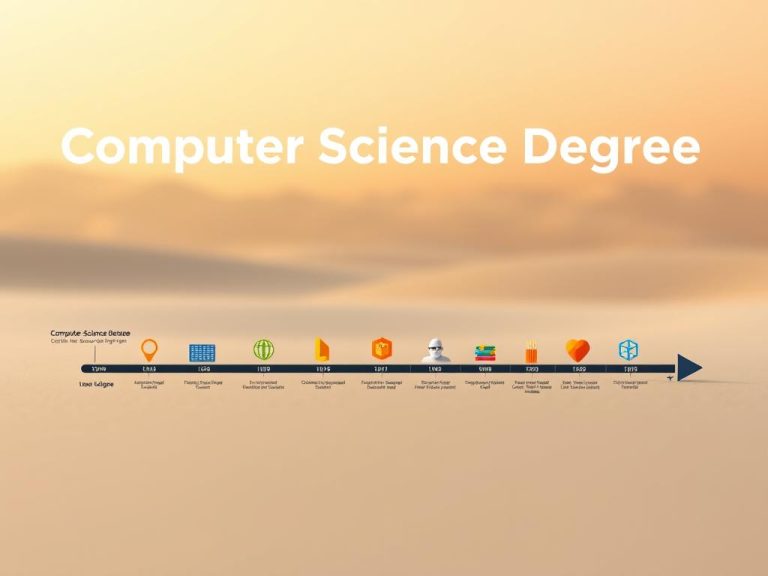What Do You Learn in Computer Science? Skills and Knowledge Breakdown
A computer science degree teaches a wide range of skills and knowledge. This includes programming languages, software development, and data structures. For example, Programming I and II classes cover about 70% of what a professional programmer needs to know.
This knowledge is key for a career in tech. Tech jobs can pay up to $107,750 a year, as the U.S. Bureau of Labor Statistics reports.
Studying computer science means becoming an expert in many areas. This includes programming languages, data structures, and software engineering. The Web Development course, for example, teaches skills like HTML, CSS, and JavaScript. These skills are directly useful for tech jobs.
With a computer science degree, you can become a computer programmer, software developer, or computer systems analyst. These jobs start with salaries between $52,224 and $68,041.
The field of computer science is always changing. It’s expected to grow by 23 percent from 2022 to 2032, the US Bureau of Labor Statistics says. As technology advances, the need for skilled computer science professionals will keep growing.
Understanding the Fundamentals of Computer Science
Computer science is a wide field that studies computers and how they work. It includes math, data analysis, and keeping information safe. Knowing the basics of computer science is key to doing well in software development. It helps in creating good data structures and algorithms.
The article on computer science basics shows how it has grown. Pioneers like Alan Turing and Ada Lovelace helped a lot. Their work led to the creation of today’s algorithms and data structures in software development.
At its heart, computer science is about what can be automated. This is key in software development and making good algorithms and data structures. Knowing these basics lets people use computer science fully. They can help make new technologies.
Core Mathematical Concepts
Math, like discrete math and linear algebra, is very important in computer science. It’s needed for making algorithms and data structures.
Computational Thinking
Computational thinking is about solving problems with computers. It’s very important for software development. It helps in making efficient algorithms and data structures.
Logic and Problem-Solving Framework
Logic and solving problems are key in computer science. They help find solutions to hard problems. This is very important for software development and making new technologies.
Programming Languages and Coding Essentials
Programming languages are key in computer science. Knowing how to code is vital for software engineers. Programming languages like Python, Java, and C++ are common in the field. They help in making software, websites, and apps.
Coding isn’t just for software making. It’s also used in data analysis, writing, and cloud computing. Employers want people who know programming languages, can analyze data, and develop software. Popular programming languages include Python, Java, JavaScript, R, C, C#, Kotlin, PHP, Go, and Swift.
Skills like algorithm coding, data structure, and web coding are also important. Software engineering principles, like design patterns and testing, are key for quality software.
- Algorithm coding
- Data structure
- Web and multimedia coding languages (HTML, CSS, JavaScript, PHP)
- Data management coding languages (SQL, NoSQL)
- Application Programming Interface (API)
- Git
Data Structures and Algorithms
Data structures are key in computer programming. They help store and organize data efficiently. This makes it easier to access and change data. In software engineering, they are used to create algorithms, which are detailed instructions for tasks.
Common data structures include arrays, linked lists, trees, stacks, queues, and graphs. These help solve problems like sorting and searching. Algorithms, on the other hand, work on these structures to perform tasks.
Knowing data structures and algorithms is vital for software engineers. It helps them solve complex problems efficiently. By mastering these, engineers can write cleaner, more efficient code. This is important in the fast-paced tech world.
Data structures and algorithms are key in many fields. They are used in operating systems, database systems, web apps, and machine learning. Companies like Google, Microsoft, and Amazon focus on these in interviews. Having a strong grasp can give you an edge in the job market.
| Data Structure | Description |
|---|---|
| Arrays | A collection of elements of the same data type stored in contiguous memory locations |
| Linked Lists | A dynamic collection of elements, where each element points to the next element |
| Trees | A hierarchical data structure, where each node has a value and zero or more child nodes |
In summary, data structures and algorithms are critical in software engineering. They help solve complex problems efficiently. By understanding and mastering these, software engineers can improve their coding skills and stand out in the job market.
What Do You Learn in Computer Science Degree Programmes?
Computer science degree programmes give you a broad education in computer science. You learn about programming languages, software development, and data structures. These courses prepare you for many career paths.
These programmes mix theory and practice. You’ll understand computer science concepts deeply and solve real-world problems. You’ll study programming languages like Java, Python, and C++. You’ll also learn about software development and data structures.
First-Year Foundation Modules
In the first year, you start with basic computer science modules. These include programming languages, data structures, and software development. They lay a strong foundation for further study and teach essential programming and problem-solving skills.
Advanced Topics and Specialisations
Later, you can dive into advanced topics like artificial intelligence, data science, and cybersecurity. These specialisations deepen your knowledge in specific areas. They prepare you for careers in these fields.
Project-Based Learning Components
Many programmes include project-based learning. This lets you apply your knowledge to real-world problems. You’ll develop skills in software development, teamwork, and communication. You’ll also build a portfolio to show to employers.
The US Bureau of Labor Statistics says computer science jobs are growing fast. They expect a 13 percent growth in these jobs from 2020 to 2030. The median salary for these jobs is $100,530, much higher than the average wage.
| Occupation | Median Salary | Projected Growth |
|---|---|---|
| Software Developers | $132,270 | 26% |
| Information Security Analysts | $120,360 | 32% |
| Computer Systems Analysts | $103,800 | 10% |
A computer science degree programme gives you a solid education. It prepares you for many careers in the field. With growing demand, you can expect good job opportunities and a high salary.
Software Development and Engineering Principles
Software development is a vital part of computer science. It involves designing and creating software systems. A solid understanding of programming languages and software engineering is key. The U.S. Bureau of Labor Statistics reports that software developers earn a mean annual wage of $138,110. The top 10 percent can earn up to $208,620.
The job outlook for software developers is bright, with a 25% growth from 2022 to 2032. This rapid growth is due to the increasing need for software across industries. To start a career in software development, consider programs like the Meta Front-End Developer Professional Certificate. It can be finished in just 7 months. Online courses and certificates, such as IBM’s DevOps and Software Engineering Professional Certificate, also offer valuable training.
Key skills for software development include being proficient in programming languages like Java, Python, and C++. Knowing software engineering principles, like agile and waterfall methodologies, is also vital. Here are some benefits of a career in software development:
- High demand and job security
- Competitive salaries and benefits
- Opportunities for advancement and specialization
- Flexibility and mobility in the workplace
Software development is a rewarding and challenging field. It requires a solid base in computer science and software engineering. With the right training and skills, individuals can have a successful career in software development. They will enjoy the many benefits it offers.
Database Management and Information Systems
Database management is key in computer science. It deals with designing and setting up database systems. This area is linked to information systems, which handle and protect data for companies. Database management covers many topics, like data structures, relational database design, and SQL and NoSQL technologies.
Good database management is vital for companies to make smart choices. It helps them gather, store, and analyze lots of data. By using data structures and information systems, companies can run better, save money, and work more efficiently. Systems like MySQL and MongoDB are now popular for managing big data.
- Relational database design
- SQL and NoSQL technologies
- Data warehousing concepts
Knowing these ideas helps companies build strong database systems. This leads to better decisions, smoother operations, and a competitive edge in the market.
Computer Networks and Cybersecurity
Computer networks are key in computer science, focusing on designing and setting up network systems. This area is closely tied to cybersecurity because networks face many cyber threats. Networks are vital in software engineering for allowing systems to talk to each other and share data.
In recent years, cybercrimes have skyrocketed, with a 452.51% increase in five years. This rise has made it essential to have experts in cybersecurity and computer networks. To meet this need, many courses and degree programs have been created. For example, a Bachelor of Science in Cybersecurity focuses on basics like networking, operating systems, and programming.
Some important topics in computer networks and cybersecurity include:
- Network protocols and architectures
- Cybersecurity threats and measures, such as firewalls and encryption
- Software engineering principles and practices
Choosing a career in computer networks and cybersecurity means helping protect people and businesses from cyber threats. It ensures data is safely shared over computer networks. With more jobs available, it’s a promising and fulfilling career, even more so when combined with software engineering skills.
Artificial Intelligence and Machine Learning Foundations
Artificial intelligence is at the heart of many modern technologies. This includes smart devices and voice assistants like Siri on Apple devices. In computer science, AI and machine learning are key areas of study.
These fields involve designing and implementing intelligent systems. These systems can do tasks that need human intelligence, like learning and problem-solving.
The use of AI and machine learning in software development has brought big changes. For example, in manufacturing, AI can automate processes by using data analytics and machine learning. It can spot equipment errors before they happen.
In banking, AI and machine learning help fight fraud and cyber attacks. This shows how AI and machine learning are changing many industries.
Neural Networks Overview
Neural networks are a key part of machine learning. They are inspired by the human brain. They have layers of nodes or neurons that process and send information.
Neural networks are used in many areas. This includes image and speech recognition, natural language processing, and decision-making.
https://www.youtube.com/watch?v=S5U76LPu_bQ
Natural Language Processing
Natural language processing is a part of AI. It’s about how computers and humans talk in natural language. It involves creating algorithms and models for computers to understand and use human language.
This field has many uses. It includes language translation, understanding feelings in text, and summarizing text.
Using AI and machine learning in software development has many benefits. It makes things more efficient, accurate, and helps with decision-making. As AI and machine learning keep growing, we’ll see even more new uses in different fields.
Conclusion: Transforming Technical Knowledge into Professional Success
Starting your journey in computer science opens up many doors. You’ve learned a lot about programming and software development. This knowledge helps you solve big problems and bring new ideas to different fields.
Now, you can find great jobs like computer support specialist, database architect, or cloud engineer. These roles pay well, from $50,500 to $137,500 a year. The need for skilled computer science experts is rising, making it a thrilling time to start your career.
Keep learning and growing, as technology changes fast. Look into getting advanced degrees, join open-source projects, and work with others in the field. This way, you’ll keep improving and help shape the future of computer science.
FAQ
What skills and knowledge can I gain from studying computer science?
Studying computer science opens up a world of skills and knowledge. You’ll learn programming languages, software development, and data structures. You’ll also explore computer networks and new technologies like AI and machine learning.
What are the core concepts in computer science?
At the heart of computer science are core mathematical concepts, computational thinking, and problem-solving. These basics help you understand software, data structures, and algorithms.
What programming languages are commonly used in computer science?
Programming languages like Python, Java, and C++ are key in computer science. They’re used for software development, data analysis, and solving problems.
What are the key data structures and algorithms in computer science?
Data structures like arrays and linked lists are vital in computer science. So are sorting and searching techniques. Knowing how to analyze algorithms is also key for efficient software.
What topics are typically covered in a computer science degree programme?
Computer science degree programmes start with foundational modules. They then move to advanced topics and specialisations like AI or cybersecurity. Practical skills are developed through projects.
What are the key principles of software development and engineering?
Software development and engineering use programming languages and tools. Agile and waterfall methodologies are key principles in this field.
How important are database management and information systems in computer science?
Database management and information systems are essential in computer science. They cover designing and maintaining database systems and data warehousing concepts.
What are the key aspects of computer networks and cybersecurity?
Understanding network protocols and architectures is vital. So is knowing about threats and protection measures like firewalls and encryption.
What are the foundations of artificial intelligence and machine learning?
The basics of AI and machine learning include neural networks and natural language processing. Deep learning applications are also key, shaping software development and data analysis.















